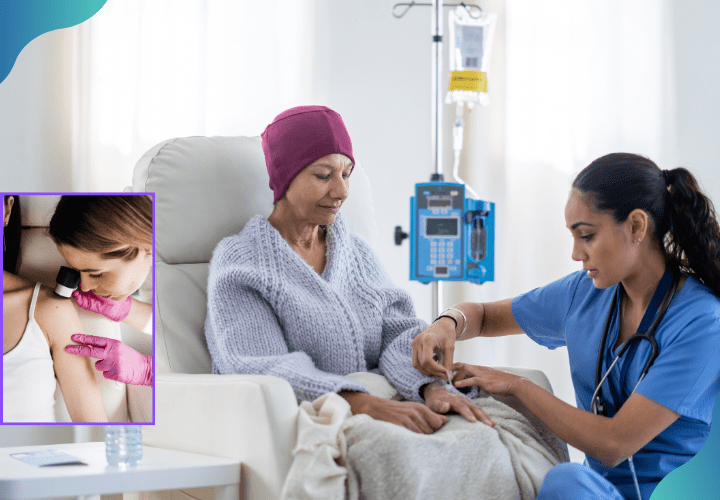Advanced skin cancer chemotherapy and its side effects

Advanced skin cancer chemotherapy and its side effects
- onco
- January 17, 2025
Millions of cases of skin cancer are detected annually, making it one of the most prevalent forms of the disease. Compared to early-stage skin cancer, which is usually successfully treated with radiation or surgery, advanced skin cancer, especially melanoma, presents more challenging issues. One of the primary treatment choices for advanced skin cancer has historically been chemotherapy. Still, with the introduction of more contemporary treatments like immunotherapy and targeted therapy, its application has changed dramatically. The various types of chemotherapy used for advanced skin cancer, their mechanisms of action, and the side effects that patients may experience will all be covered in this blog post. So, let’s start!
Know about Advanced Skin Cancer:
The three primary forms of skin cancer are melanoma, squamous cell carcinoma, and basal cell carcinoma. The most deadly of them is melanoma, which is frequently discovered in its advanced stages after it has metastasized or spread to other parts of the body. Cancers that have progressed to the lymph nodes or other organs are referred to as advanced skin cancer. At this point, local treatments like surgery are insufficient to control the disease. Thus, treatment becomes more aggressive and sophisticated.
Chemotherapy is one drug used to treat or halt the spread of advanced skin cancer. This entails employing medications to kill or prevent cancer cells from proliferating and further dividing.
How Does Chemotherapy Work for Skin Cancer?
Chemotherapy medications, such as cancer cells, target and destroy cells that divide quickly. Chemotherapy can target cancer cells because they often proliferate and multiply more quickly than healthy cells. Chemotherapy, however, can harm both healthy and cancerous cells since it targets all fast-dividing cells. This could have several detrimental effects.
Read More Blog: How Does Chemotherapy Actually Work Against Cancer?
When other therapies, such as radiation or surgery, are either impractical or unsuccessful for advanced skin cancer, chemotherapy is typically utilized. Chemotherapy can be administered in a number of ways, including:
Intravenous (IV) infusion – The most popular technique for delivering chemotherapy medications straight into the bloodstream is IV infusion.
Oral chemotherapy: Some chemotherapy medications are given orally and are in pill form.
Topical chemotherapy – Topical chemotherapy, such as creams or ointments, may be used to treat superficial cancers in some non-melanoma skin cancer patients.
Intralesional chemotherapy – Chemotherapy is injected directly into the tumour using the intralesional approach.
The drugs and treatment strategies depend on the type and stage of skin cancer. Common chemotherapy drugs for metastatic melanoma include dacarbazine (DTIC), temozolomide, carboplatin, cisplatin, nivolumab, and pembrolizumab; while these are technically immunotherapy drugs, they can be administered in conjunction with chemotherapy.
Common Chemotherapy Side Effects:
Chemotherapy frequently has several adverse effects, even if it can be helpful in treating advanced skin cancer. Chemotherapy causes these adverse effects because it damages healthy cells that divide quickly, like those in the bone marrow, hair follicles, and digestive tract, in addition to the cancer cells.
- Fatigue: One of the most frequent adverse effects of chemotherapy is fatigue. Anaemia, a drop in red blood cells that frequently happens with chemotherapy or the chemotherapy itself, maybe the reason. Patients may find it challenging to do daily duties due to the incapacitating effects of fatigue.
- Vomiting and Nausea: Chemotherapy’s impact on the digestive tract might result in nausea and vomiting. The severity of these symptoms can vary. Antiemetic drugs are frequently used in conjunction with chemotherapy to lessen these adverse effects.
- Hair Loss: Since hair follicle cells are some of the body’s fastest-dividing cells, hair loss is a frequent side effect of chemotherapy, which targets cells that divide quickly. Patients receiving therapy for advanced skin cancer may find this especially upsetting because it may have an impact on their look and sense of self. Usually, the hair loss is very temporary, and after the chemotherapy is over, the hair will regrow.
- Weakened Immune System: White blood cells, which are in charge of battling infections, can be decreased by chemotherapy. As a result, patients become more susceptible to infections, which can be dangerous and even fatal. Chemotherapy patients frequently need to take steps to prevent disease, and their doctors may routinely check their white blood cell counts.
- Mouth Sores and Mouth Ulcers: Chemotherapy may harm the oral lining, resulting in excruciating sores or ulcers. As a result, patients may find it challenging to communicate, eat, and drink. Using medicated mouthwashes and practising good oral hygiene can help control these symptoms.
- Diarrhea or Constipation: Chemotherapy medications may impact the digestive tract, resulting in constipation or diarrhoea. While constipation can result in discomfort and bloating, diarrhoea can induce dehydration. To control these symptoms, patients are frequently counselled to modify their diet and may be prescribed medication.
- Peripheral Neuropathy: Peripheral neuropathy is a disorder that can result from certain chemotherapy medications damaging the peripheral nerves. Symptoms of this illness include discomfort, tingling, or numbness in the hands and feet. In extreme situations, it may impair a patient’s capacity to walk or use their hands well.
- Skin Changes: Chemotherapy can also alter the skin in patients with skin cancer. Dryness, rash, or heightened sensitivity to sunlight are a few examples of this. These adverse effects can be especially troubling because individuals with advanced skin cancer are already more likely to experience skin problems.
As oncology continues to develop, patients who might not react well to conventional chemotherapy now have hope because of novel treatments like immunotherapy and targeted therapy. For patients with advanced skin cancer, comprehending and controlling the adverse effects of chemotherapy for skin cancer is still an essential component of the therapeutic process. Many patients can overcome these obstacles and improve their prognosis with the correct assistance and medical attention. If you also want to seek medical care from the finest cancer hospital in Delhi, India, then you should consult with Oncoplus. To realize the goal of a cancer-free and cancer-informed India, Oncoplus collaborated with the Indian social security programs. Everyone in society should receive compassionate care.





Leave a Reply